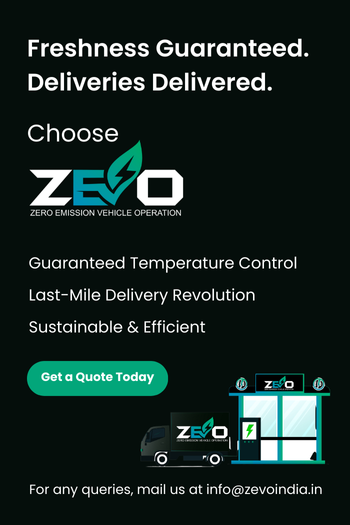How Electric Vehicles Are Reducing the Carbon Footprint of Food Delivery

Akshay Sharma
CEO's Office @ZEVO
The adoption of electric vehicles (EVs) in food delivery services is playing a significant role in reducing carbon footprint and promoting sustainability within the logistics sector.
As delivery demand surges, particularly in the wake of the COVID-19 pandemic, the environmental impact of traditional fuel-powered vehicles has become a pressing concern. Transitioning to electric vehicles (EVs) for food delivery offers a viable solution to mitigate these effects.
Impact of Electric Vehicles on Carbon Emissions
- Reduction in Tailpipe Emissions: Electric vehicles produce zero tailpipe emissions, significantly reducing air pollution and greenhouse gas emissions compared to conventional gasoline or diesel vehicles. For instance, Zomato’s introduction of an all-electric ‘Large Order Fleet’ aims to minimize its environmental footprint, aligning with broader sustainability goals in the food delivery ecosystem and contributing to food delivery emissions reduction.
- Statistical Insights: A study highlighted that the lifetime emissions of a Nissan Leaf are three times lower than those of a conventional diesel vehicle, illustrating the substantial benefits of EVs in reducing the overall carbon footprint. Furthermore, as more countries transition to cleaner energy sources for electric vehicle charging infrastructure, the environmental advantages of EVs will become even more pronounced.
- Projected Growth in Delivery Vehicles: The delivery sector is expected to see a 36% increase in vehicles by 2030, which could escalate carbon emissions without the adoption of greener technologies. The shift to electric vehicle adoption in the food supply chain is crucial for balancing the growing demand for deliveries with the need to protect the environment.
ZEVO's Role in Green Last-Mile Logistics
- Comprehensive EV Solutions: ZEVO India offers an EV-as-a-Service model for last-mile logistics that simplifies access to electric vehicles for businesses. This model eliminates the complexities associated with vehicle ownership, including electric vehicle maintenance costs and charging infrastructure, making it easier for companies to transition to electric fleets. This service is particularly beneficial for green last-mile delivery, where efficiency and sustainability are paramount.
- Diverse Fleet Offerings: ZEVO’s fleet includes electric two-wheelers, three-wheelers, and small vans, catering to various delivery needs. This diversity allows businesses to select the most suitable vehicle for their operations, enhancing delivery efficiency and reducing operational costs. For instance, delivery businesses using electric scooters have reported cutting fuel expenses by over 30% monthly, highlighting the economic benefits of EVs in food delivery.
- Environmental Impact: By utilizing electric vehicles, ZEVO contributes to significant reductions in greenhouse gas emissions. The transition to EVs in last-mile logistics not only helps in curbing air pollution but also supports broader environmental goals, aligning with national targets for EV adoption in India.
- Strategic Partnerships: ZEVO has formed strategic alliances, such as with Zen Mobility electric vehicles, to enhance its delivery capabilities. This partnership aims to deploy innovative vehicles like the Zen Micro Pod, designed for urban environments, further improving the efficiency of last-mile deliveries while minimizing the carbon footprint.
- Future Expansion Plans: ZEVO plans to expand its fleet to 10,000 vehicles and enhance its presence across India, focusing on tier 2 and tier 3 cities. This expansion is crucial for meeting the growing demand for sustainable food delivery solutions and improving the logistics landscape in the country.
Green Benefits of Switching to Electric Vehicles
- Cost Efficiency: Operating electric vehicle fleets can lead to significant cost savings. EVs generally have lower fuel and maintenance costs due to fewer moving parts and the efficiency of electric motors. This economic advantage is compounded by government incentives for electric vehicles that further reduce the upfront costs of EVs for businesses.
- Enhanced Public Health: By reducing emissions from delivery vehicles, EVs contribute to better air quality, which has positive implications for public health. Studies have linked vehicle emissions to respiratory and cardiovascular diseases, making the transition to EVs not only an environmental imperative but also a public health benefit.
- Corporate Responsibility and Brand Image: Companies like Zomato are recognizing the importance of sustainability in their operations. By adopting electric vehicles, they not only comply with regulatory requirements but also enhance their brand image as socially responsible organizations. This shift meets the growing consumer demand for sustainable practices.
- Future Goals: Zomato has set ambitious targets, aiming for 100% of its deliveries to be made using electric vehicles by 2033, demonstrating a strong commitment to sustainability and carbon neutrality across its delivery value chain, utilizing its electric vehicle fleet management strategies effectively.
Conclusion
In summary, the integration of electric vehicles into food delivery services, especially through innovative solutions like those offered by ZEVO India, presents a transformative opportunity to significantly reduce carbon emissions, promote public health, and enhance corporate responsibility. As the industry moves towards greener logistics, the benefits of adopting electric vehicles will continue to grow, paving the way for a more sustainable future. This comprehensive overview highlights the critical role of electric vehicles in reducing the carbon footprint of food delivery, with a special focus on ZEVO India’s contributions to last-mile logistics.

Share this Article
Subscribe to our newsletter
Be the first to receive exclusive offers and the latest news on our products and services directly in your inbox.
